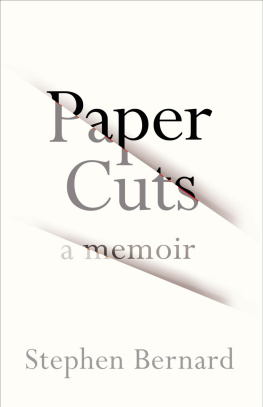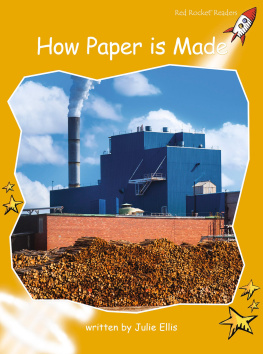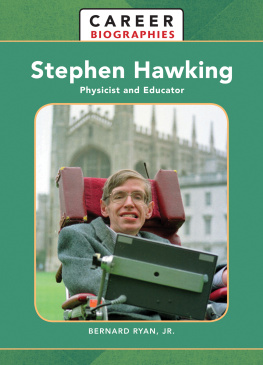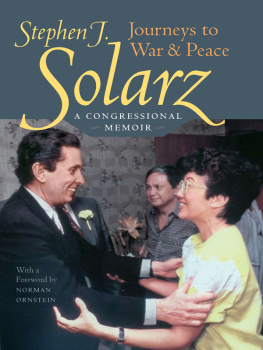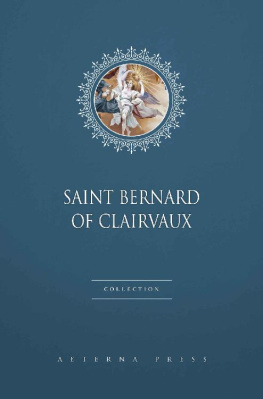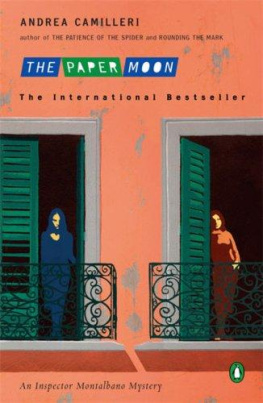Stephen Bernard - Paper Cuts: A Memoir
Here you can read online Stephen Bernard - Paper Cuts: A Memoir full text of the book (entire story) in english for free. Download pdf and epub, get meaning, cover and reviews about this ebook. year: 2018, publisher: Jonathan Cape, genre: Non-fiction / History. Description of the work, (preface) as well as reviews are available. Best literature library LitArk.com created for fans of good reading and offers a wide selection of genres:
Romance novel
Science fiction
Adventure
Detective
Science
History
Home and family
Prose
Art
Politics
Computer
Non-fiction
Religion
Business
Children
Humor
Choose a favorite category and find really read worthwhile books. Enjoy immersion in the world of imagination, feel the emotions of the characters or learn something new for yourself, make an fascinating discovery.
- Book:Paper Cuts: A Memoir
- Author:
- Publisher:Jonathan Cape
- Genre:
- Year:2018
- Rating:4 / 5
- Favourites:Add to favourites
- Your mark:
- 80
- 1
- 2
- 3
- 4
- 5
Paper Cuts: A Memoir: summary, description and annotation
We offer to read an annotation, description, summary or preface (depends on what the author of the book "Paper Cuts: A Memoir" wrote himself). If you haven't found the necessary information about the book — write in the comments, we will try to find it.
Paper Cuts: A Memoir — read online for free the complete book (whole text) full work
Below is the text of the book, divided by pages. System saving the place of the last page read, allows you to conveniently read the book "Paper Cuts: A Memoir" online for free, without having to search again every time where you left off. Put a bookmark, and you can go to the page where you finished reading at any time.
Font size:
Interval:
Bookmark:


I have a small line of red dots on the back of my left hand, where the needle goes in. I have had hundreds of ketamine injections, more than anyone else, perhaps. The needle goes in, and the truth comes out. Sometimes I am a child again. Sometimes I have the innocence of a child, but I am not innocent. I know too much. I have known too much.
With Paper Cuts, Stephen Bernard boldly tests the bounds of what a memoir can achieve. Living through the trauma of childhood abuse and mental illness, he writes to escape and confront, to accuse and explain.
Each morning when he wakes, Stephen Bernard must literally reconstruct his self: every night he writes himself a letter to be read the next day. The fractured, intensely personal narrative of Paper Cuts follows a single day in his life as he navigates a course through the effects of mania, medication and memories. The result is painful, unique and inspiring.
Stephen Bernard is an English academic at the University of Oxford and formerly a British Academy Post-doctoral Research Fellow and Junior Research Fellow of University College, Oxford. He is the editor of The Literary Correspondences of the Tonsons and The Plays and Poems of Nicholas Rowe, and reviews for the Times Literary Supplement. Paper Cuts is his first and only experiment in autobiography.
To Felix and Hugo

There will be some merit in getting my thoughts down on paper, after all this, that. It has taken some time to get this far, and some trouble too. Has it been worth taking the trouble, I wonder? Will it be worth the trouble to do this? I am just one; there have been many. The stories of each of them, of us, must be worth the telling (I think).
I will start with my own story, of a day in January 2016, and of the trouble I went to to write an essay about a man who lived some time ago, who left his mark on the world by shepherding the present into the future. There were others, of course, but I choose him, choose one, to illustrate my point. He is the most important to me, then, now.
Today I construct the self. Each day I construct the self. From the waste hours of sleep I wake and, stiff of limb and muddled in mind, I wonder who I am and where I am. In the darkness I reach for the iPad, my iPad (I dont think). What is the time? I know that there is such a thing as time, although I am at that moment out of it. Five oclock, just gone.
I urinate in the bathroom. I remember somehow on the sudden upstairs somewhere and another time. And the shame. Well. I brush my teeth. It has gone five (I think).
I go to the desk in my study and open the blinds. It is still dark out. I look at the computer. I switch it on. Click. I look at The Times online. Click. Bowies dead. No! Surely this means something. Surely I know what Im doing, more than Im letting on.
What a lucky planet we were to have had David Bowie. So lucky. Imagine how vast all of space and time is how endless and empty, how black and cold. Imagine a tracking shot across the universe, nothing happening nearly everywhere, nearly all the time.
And then, as it scrolls past our galaxy, you can hear, quiet at first, but getting louder as we close in, Rebel Rebel, coming from our planet, from our country, in our time, playing on tinny transistor radios, in a million bedrooms, as a whole generation, and the next, and the next, straighten their spines, and feel their pulses rise, and say: This. This is how I feel. Or at least, this is how I feel now. Now Ive heard this.
I switch the kettle on in the kitchen and brew some coffee. This will wake me up, make me present and correct in the world. I switch the radio on. Theres been an accident, somewhere Ive never heard of. Uninterested, I take my coffee to the desk.
On my desk theres a silver frame with the picture of a young woman in it. She is in a wedding dress, her wedding dress (I think). She looks happy. Coffee. Sip. Who is that man? Who is that man next to her? Him. In the dove-grey, white-shirted suit. He must be her husband, or her husband-to-be. On the threshold: my father. I do not remember the face, but I must have had a father (I think). Father.
I switch on the television on the wall in my study. Ziggy Stardust plays. Now there is both the sound of the radio from the kitchen and that of the TV curdling-electric in my flat. Outside no bird sings. I am in Jericho and far from the Meadows. Inside its warm, but outside theres a chill as cold as no wonder.
I wash and go to my room light; light but none outside and get dressed. Clean clothes look sharp! look smart to face the day.
Medication. And a cigarette outside the pub over the road. There is a chill, after all. Hello, the house!
*
I feel in my pocket as I smoke. Here is a letter to someone.
Today you construct the self. Each day you construct the self
It is a letter from me, to me.
You become the self as the day develops.
You are stiff because of the medication. You went to bed at eight, but were not asleep at midnight.
Have you taken your medication?
A letter from the night-time to face the day. I stub out my cigarette and re-enter my flat opposite. Someones got the radio and the TV on. Have you taken your medication?
One tablet. Two tablets. Four tablets. Nine tablets. Today will be the day. Today will be the day when it all gets right. You can put it right. Swallow. The self. In a bottle.
*
You swallow the ketamine, which you have been prescribed for your condition, with the orange squash. Time passes.
*
Welcome. To. The. Multiverse! An infinity of meaning in an ununaspirated letter. Suddenly, on a sudden, and in a moment now! A year passes or was that just a minute? The child of the past breaks out from the infinity of meaning and now before you know it all time is there, is here, is now. This sentence is about nothing but itself. But already it is about other sentences, framing its meaning, and the multiverse reigns, as a bull in a china shop. Infinitudes like a, like a fugue in the mind.
*
I read the Whitehall Evening Post for 14 January 1705. Every day now for five years I have read the days newspapers of the day since 1 January 1701. It is my secret, which I tell you now. I read the news of the day, and then read some of the books published that day. I know what happens next, but I kid myself I do not. I totally immerse myself in the eighteenth century. Before I die, I know, Alexander Popes Dunciads will be published and I will probably die with Henry Fieldings Tom Jones in my hand. The rise of the novel, as scholars used to call it. Except, so far, theres not much of a novel to speak of. Nor is there any Spectator coming daily from the press and being republished in volume form yearly for the rest of the eighteenth century. Today Thomas Betterton the actor is ill. Next week, I know he will deliver one of the greatest performances of his career of the eighteenth century but for the moment he has a cholic and is not expected to last.
I go to conferences, academic conferences, and people say things like Godolphin was at a nervous point in his career Too right! I think he had a lot to be nervous about. Right now its all about the duke of Marlborough. And the funny thing is that there are almost no women. Where are all the women (I think)? In the archive. Hardly in the press, or coming from the press. Sometimes someone will appear in history, in time, who stands beyond the archive, whose story will last. Men and women so remarkable, or whose work is so sublime or horrific that they cannot be contained in the archive. Marlborough was such a man. There have been others.
Font size:
Interval:
Bookmark:
Similar books «Paper Cuts: A Memoir»
Look at similar books to Paper Cuts: A Memoir. We have selected literature similar in name and meaning in the hope of providing readers with more options to find new, interesting, not yet read works.
Discussion, reviews of the book Paper Cuts: A Memoir and just readers' own opinions. Leave your comments, write what you think about the work, its meaning or the main characters. Specify what exactly you liked and what you didn't like, and why you think so.

